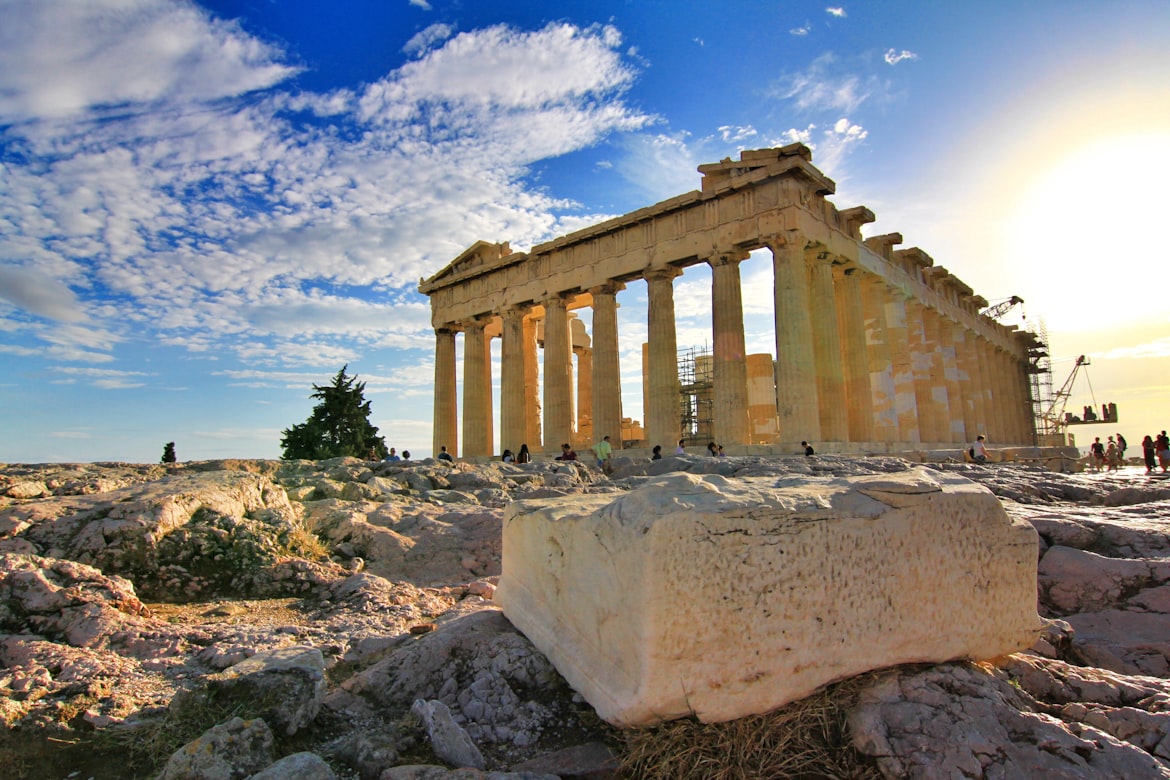Top Attractions
Greece offers a mesmerizing blend of ancient history, sun-soaked beaches, and charming island life. One of the country’s top attractions is the Acropolis in Athens, where travelers can marvel at the Parthenon and learn about classical Greek civilization. Santorini, with its iconic white-washed buildings and caldera views, is a must-visit for romantic getaways and photography enthusiasts. In Crete, the Palace of Knossos provides a glimpse into Minoan civilization, while the island’s Samaria Gorge attracts hikers with its dramatic cliffs and wild landscapes. For those interested in history and mythology, the ancient site of Delphi and the monasteries of Meteora—perched atop towering rock pillars—are not to be missed. The beaches of Zakynthos, including the famous Navagio (Shipwreck) Beach, offer turquoise waters and stunning coastal beauty.
Local Dishes
Greek cuisine is rich in flavor, tradition, and fresh ingredients. A classic starter is tzatziki, a refreshing dip made from yogurt, cucumber, garlic, and olive oil, often served with warm pita bread. Moussaka, a layered eggplant and minced meat dish topped with béchamel sauce, is a hearty main course found in tavernas across the country. Souvlaki, skewered grilled meat (often pork or chicken), is served either on its own or wrapped in pita with tomatoes, onions, and tzatziki. For seafood lovers, grilled octopus and fresh fish caught daily from the Aegean and Ionian Seas are delicious and widely available. Greek salad, with tomatoes, cucumbers, olives, onions, and a generous slab of feta cheese, is a staple side dish. To finish off a meal, try baklava—a sweet, sticky dessert made of layers of phyllo pastry, nuts, and honey syrup.
Transportation Tips
Getting around Greece is generally straightforward, especially between major cities and islands. In Athens, the metro system is clean, affordable, and efficient, connecting the airport with central neighborhoods and tourist spots. Buses and suburban trains serve most mainland towns and villages, though schedules may vary and should be checked in advance. Ferries are the main form of transport between islands, with companies like Blue Star and Hellenic Seaways offering daily services. Booking ferry tickets in advance during summer months is recommended due to high demand. Renting a car is ideal for exploring the Peloponnese or northern Greece, though drivers should be cautious on winding mountain roads. On islands, ATVs and scooters are popular rentals, but travelers should ensure they are licensed and insured for safety and legality.
Budget Travel Tips
Travelers on a budget can enjoy Greece without compromising the experience. Visit during the shoulder seasons (April–June or September–October) for lower accommodation prices and fewer crowds. Choose to stay in family-run guesthouses or Airbnb apartments rather than hotels. Eat where the locals eat—look for small tavernas that serve traditional dishes at reasonable prices, often with set menus. Island-hop using slow ferries instead of high-speed boats to save on transport. Many historical sites offer discounted entry for students or EU citizens, and several museums are free on the first Sunday of the month during the off-season. Tap water is drinkable in most places on the mainland, which helps avoid bottled water costs.
Safety Info
Greece is generally a safe destination for travelers, with low crime rates and a welcoming attitude toward tourists. Petty theft, such as pickpocketing, can occur in crowded areas like public transport in Athens or busy tourist sites, so keep an eye on your belongings. Avoid walking alone in unfamiliar neighborhoods late at night. In remote areas or islands, be mindful of medical facility availability—travel insurance that covers emergency evacuation is recommended. Natural hazards, such as strong sea currents or wildfires in summer, should be considered. Follow local advice and regulations when swimming or hiking.
Cultural Etiquette
Greeks are warm, hospitable, and expressive, and they value family and tradition. A firm handshake and direct eye contact are standard when greeting someone. It's customary to say "kalimera" (good morning) or "kalispera" (good evening) as a polite acknowledgment. When visiting churches or monasteries, dress modestly—cover shoulders and knees, and remove hats. Tipping is appreciated but not mandatory; rounding up the bill or leaving 5–10% is common in restaurants. Public displays of affection are generally accepted, but visitors should avoid loud or disruptive behavior in sacred or formal settings.
Travel Style Fit
Greece is an ideal destination for history buffs, beach lovers, and foodies. It's perfect for romantic travelers, such as honeymooners, thanks to its stunning sunsets and island charm. Solo travelers will appreciate the country’s safety and welcoming locals, while families can find a wealth of kid-friendly activities and relaxed beach towns. Whether you’re a luxury seeker or a shoestring backpacker, Greece’s diverse offerings can be tailored to match almost any travel style.

Best Time to Visit
The ideal time to visit Greece is during the shoulder seasons, from late April to early June and again from September to mid-October. During these months, the weather is warm and sunny, perfect for sightseeing and island-hopping, but the crowds are significantly thinner than in July and August. Summer is the peak tourist season, with hot temperatures and high prices, especially on popular islands like Santorini and Mykonos. Winter can be chilly and wet in the north and mainland, though Athens remains a viable destination year-round with fewer tourists and lower costs.
Accommodation Recommendations
For budget travelers, hostels such as City Circus Athens or Caveland in Santorini offer vibrant social atmospheres and comfortable dorms. Family-run pensions in places like Naxos or Thessaloniki provide affordable, authentic lodging.
For those seeking moderate comfort, consider staying at mid-range boutique hotels like AthensWas or Kalisti Hotel in Santorini, which offer tasteful decor, good locations, and quality service without the luxury price tag. These are ideal for couples or small families looking for a balance of affordability and comfort.
Luxury travelers can indulge in iconic properties such as Canaves Oia Suites in Santorini or Amanzoe in Porto Heli, which provide world-class service, private infinity pools, gourmet dining, and panoramic views. These resorts cater to discerning travelers seeking a refined and indulgent escape.
Languages Spoken
Greek is the official language, and while learning a few basic phrases (like "efcharistó" for thank you) is appreciated, English is widely spoken in tourist areas, hotels, restaurants, and by younger Greeks. Signage in cities and transportation hubs usually includes English translations, making navigation relatively easy.
Currency
Greece uses the euro (€). ATMs are widely available in cities and towns, though some smaller islands or remote areas may have limited access. Credit and debit cards are accepted in most establishments, but it's wise to carry cash for small purchases, transportation, or in rural regions. Notify your bank before traveling to avoid card blocks due to foreign activity.
Common Traveler Mistakes to Avoid
Many travelers underestimate travel time between islands and mainland destinations—plan ferry routes and times in advance, especially during high season. Another common mistake is overpacking: opt for light, breathable clothing, especially during summer. Avoid renting scooters or ATVs without proper licensing or insurance. Some tourists also miss out on authentic Greek experiences by sticking only to major hotspots—don’t be afraid to explore lesser-known islands like Naxos or towns like Nafplio.
Essential Apps & Tools
Download Ferryhopper to book island ferries and check real-time availability. Google Maps is helpful for navigating city streets, while apps like Beat (a local ride-hailing app) and Moovit help with local transportation. Translation apps like Google Translate are handy for menu reading and signs in non-tourist areas. XE Currency is useful for checking conversion rates.
Suggested Itinerary Styles
A well-rounded Greece itinerary begins with 2–3 days in Athens for ancient ruins and museums, followed by a few days exploring the Peloponnese or Delphi for more historical depth. Then head to one or two islands—Santorini for romance and views, and Paros or Crete for beaches and local culture. If time allows, end your journey in Thessaloniki for Byzantine history and culinary delights.
Fun Facts
Greece has more archaeological museums than any other country in the world, reflecting its rich ancient history. It boasts over 6,000 islands and islets, though only about 200 are inhabited. The country also enjoys more than 250 days of sunshine a year, making it one of the sunniest places in Europe. Greece is the birthplace of democracy, the Olympic Games, and many foundational concepts in Western philosophy, mathematics, and theater.
